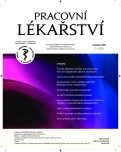Psychohygiene (not only) as prevention of the burn-out syndrome in medical management
Authors:
Vávrová Petra 1; Pastucha Dalibor 2
Authors‘ workplace:
Katedra andragogiky, sociologie a kulturní antropologie, Filozofická fakulta UP v Olomouci, vedoucí pracoviště doc. PhDr. Dušan Lužný, Dr.
1; Klinika tělovýchovného lékařství a kardiovaskulární rehabilitace LF UP a FN Olomouc, vedoucí pracoviště doc. MUDr. Eliška Sovová, Ph. D., MBA
2
Published in:
Pracov. Lék., 65, 2013, No. 1-2, s. 53-58.
Category:
Review Article
Overview
The component of the high manager activities in medical services is not only the contact with patients but also the often neglected demanding situations in management of personnel. These situations induced stress reactions, which put emphasis on the qualifications for adaptation, handling and resilience of the top manager. In the medical management the risks are cumulated – it is the concurrence of helping and managing profession. The author presents selected principles of psychohygiene and examples of its application in practice, since if its absence can result in exhaustion of the organism, dissatisfaction and consequently the burn-out syndrome. The basic questions or principles of psychohygiene include positive thinking, regimen (or lifestyle), active exercise, sleep and relaxation, self-recognition and time organization. Psychohygiene is also positively influenced by assertive refusal of inadequate requirements and communication of emotions.
Keywords:
psychohygiene – top manager in medical services – burn-out syndrome – positive thinking – sleep – self-recognition – auto-regulation of emotions – assertiveness
Sources
1. Bedrnová, E. et al. Duševní hygiena a sebeřízení. 1. vyd. Praha: Fortuna, 1999, ISBN 80-7168-681.
2. Kebza, V., Šolcová, I. Syndrom vyhoření. 2. rozšířené vyd. Praha: Státní zdravotní ústav, 2003. ISBN 80-7071-231-7.
3. Kolařík, M. Interakční psychologický výcvik. 1. vyd. Praha: Grada, 2011, ISBN 978-80-274-2941-1.
4. Kopřiva, K. Lidský vztah jako součást profese. 1. vyd., Praha: Portál, 1997, ISBN 80-7178-150-9.
5. Křivohlavý, J. Psychologie zdraví. 1. vyd., Praha: Portál, 2001, ISBN 80-7178-551-2.
6. Kříž, P. Kdo jsem, jaký jsem. 1. vyd. ,Kladno: ASIS, 2005, ISBN 80-239-4669-2.
7. Kuneš, D. Sebepoznání. 1. vyd., Praha: Portál, 2009, ISBN 978-80-7367-541-7.
8. Mikuláštík, M. Manažerská psychologie. 1. vyd., Praha: Grada, 2007, ISBN 978-80-247-1349-6.
9. Nakonečný, M. Encyklopedie obecné psychologie. 2. vyd., Praha: Academia, 1997, ISBN 80-200-0625-7.
10. Nakonečný, M. Sociální psychologie. 1. vyd., Praha: Academia, 1999, ISBN 80-200-0690-7.
11. Plháková, A. Učebnice obecné psychologie. 1. vyd., Praha: Academia, 2003, ISBN 80-200-1086-6.
12. Slezáčková, A. Průvodce pozitivní psychologií. 1. vyd., Praha: Grada, 2012, ISBN 978-80-247-3507-8.
13. Vybíral, Z. Psychologie komunikace. 2. vyd., Praha: Portál, 2009, ISBN 978-80-7367-387-1.
14. Vymétal, J., Rezková, V. Rogersovský přístup k dospělým a dětem. 1. vyd., Praha: Portál, 2001, ISBN 80-71785-61-X.
Labels
Hygiene and epidemiology Hyperbaric medicine Occupational medicineArticle was published in
Occupational Medicine

2013 Issue 1-2
Most read in this issue
- Compensation exercise in patients with occupational lesion of ulnar nerve in the elbow region
- Focal dystonia in professional musicians
- Psychohygiene (not only) as prevention of the burn-out syndrome in medical management
- Does liver fibrosis represent a reversible process?
